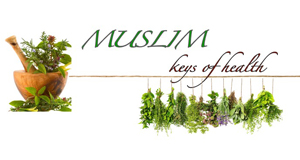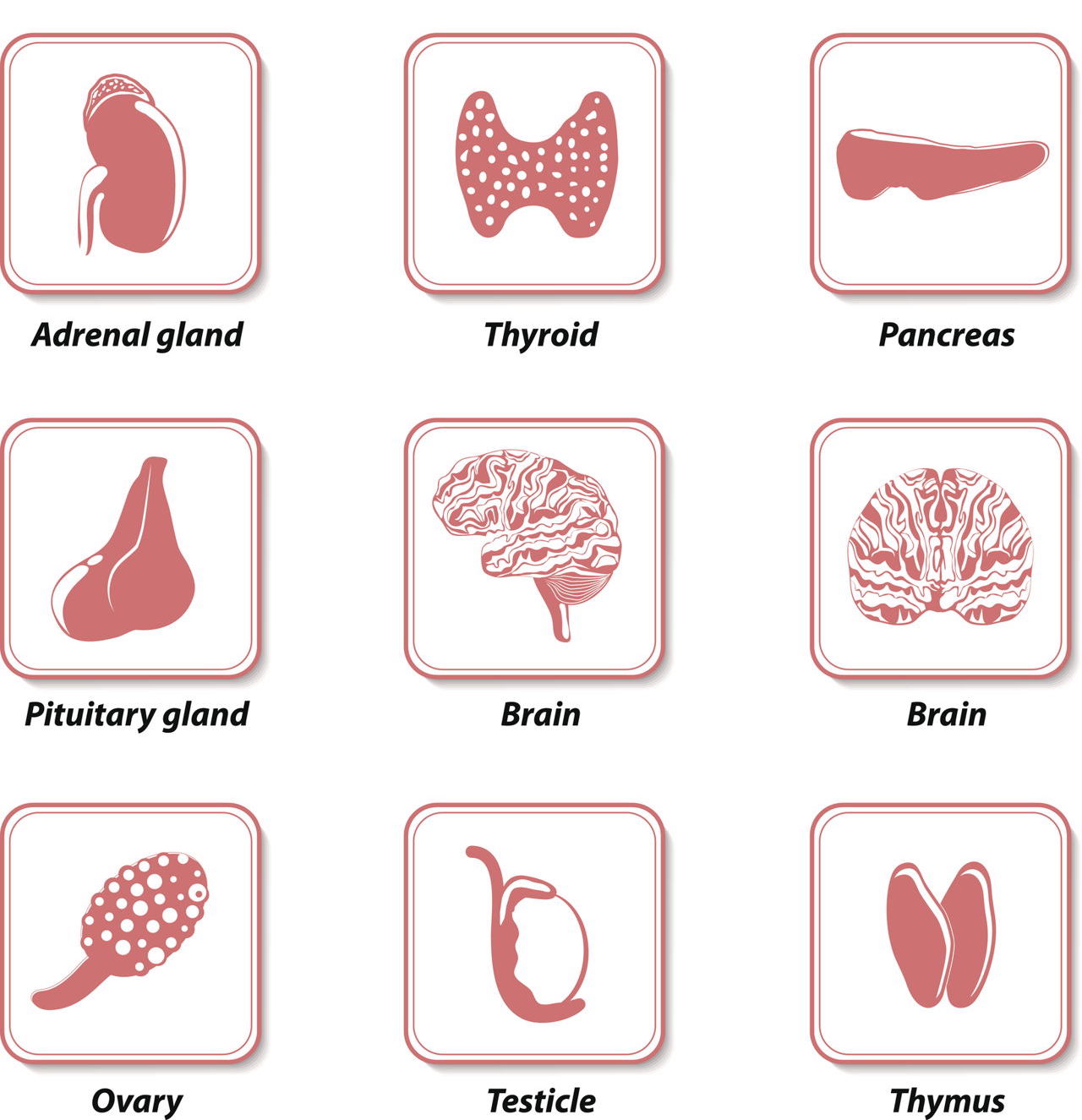GET TO KNOW YOUR GLANDS
and their function
Glands are the silent soldiers of the body which keep it protected and functioning properly without attracting too much attention. Unfortunately, most of us find out about our glands is when they dysfunction and our body begins to go haywire.
Glands are organs in the human or animal body which secrete particular chemical substances for use in the body or for discharge into the surroundings.
I believe we owe it to our health to learn about these chemical messengers, and take care of them properly. In this article, I will introduce you to each of your glands and then give you a general guideline on how to take care of them so they don’t dysfunction and keep on protecting your health.
What glands do we find in our body and what’s their function?
All the glands in your body that make hormones are part of endocrine system. These chemical messengers are instrumental in keeping our body working properly, the way it should. If your endocrine system is not healthy you may experience concerns with weight, acne, menstruation, getting pregnant, managing stress, bone density, lack of energy among a myriad of other problems.
courtesy of chartdiagram.com
Many different glands make up the endocrine system. The hypothalamus, pituitary gland, and pineal gland are part of your brain. The thyroid and parathyroid glands are in your neck. The thymus is between your lungs, the adrenals are on top of your kidneys, and the pancreas is behind your stomach. Your ovaries (if you’re a woman) or testes (if you’re a man) are in your pelvic region.
Hypothalamus: This organ connects your endocrine system with your nervous system. Its main job is to tell your pituitary gland to start or stop making hormones.
Pituitary: This is the master gland of your endocrine system. It uses information it gets from your brain to tell other glands in your body what to do. It makes many different important hormones, including growth hormone; prolactin, which helps make milk in breastfeeding women; and luteinizing hormone, which manages estrogen in women and testosterone in men.
Pineal: This gland makes a chemical called melatonin. It helps your body get ready to go to sleep.
Thyroid: This gland makes thyroid hormone, which controls your metabolism. If this gland doesn’t make enough (called hypothyroidism) everything happens more slowly. Your heart rate might slow down, you could get constipated, and you might gain weight.
If it makes too much hormone (called hyperthyroidism), everything speeds up. Your heart might race, you could have diarrhea, feel anxiety, and you might lose.
Parathyroid: This is a set of four small glands behind your thyroid. They are important for bone health. The glands control levels of calcium and phosphorus in your body.
Thymus: This gland makes white blood cells called T-lymphocytes that fight infection and are crucial for immune system, specifically for children. The thymus starts to shrink after puberty.
Adrenals: Best known for making the fight or flight hormone adrenaline (epinephrine) these two glands also make corticosteroids. These hormones affect your metabolism and sexual function, among other things.
Pancreas: The pancreas is part of both your digestive and endocrine systems. It makes digestive enzymes that break down food. It also makes the hormones insulin and glucagon which helps ensure you have the right amount of sugar in your bloodstream and your cells.
If you don’t make any insulin, which is the case for people with type 1 diabetes, your blood sugar levels can get dangerously high. In type 2 diabetes, the pancreas usually makes some insulin but not enough.
Ovaries: In women, these organs make estrogen and progesterone. These hormones help develop breasts at puberty, regulate the menstrual cycle, and support pregnancy.
Testes: In men, the testes make testosterone. It helps them grow facial and body hair at puberty. It also causes the penis to grow larger and plays a role in making sperm.
HEALTH ISSUES RELATED TO GLANDS
As we age, our body begins to slow down and goes through a natural process of ‘wear and tear.’ Some of the common noticeable shifts as we age are: slowed metabolism therefore subsequent weight gain, pancreatic function etc. Stress, infections, chemical and toxin exposure, and lifestyle choices such as unhealthy diet and improper sleeping also affect our endocrine system.
We age, there is no going around that, but what we can control to a certain degree is how fast we age. Have you heard of people ‘aging well’ or ‘aging gracefully’? Slowing down our aging process is very closely tied to the health of our endocrine system. The healthier your glands, they more properly they will function and will continue to do their job longer providing the body what it needs in order to work meticulously.
WHAT CAN YOU DO FOR YOUR GLANDS’ HEALTH
Your glands need consideration and caring, just like the rest of your organs. In my opinion, these are some of the most important things for the wellbeing of our glands.
- Vitamins and Minerals
The main food for our glands is the vitamins and minerals we get from foods. Unfortunately, most of our food is cooked; during the cooking process most of the vitamins, minerals and enzymes are wasted. This is why glandular dysfunctions and diseases are on the rise, especially in parts of the world where diets lack fresh produce. The easiest way to feed your glands and ensure proper hormonal balance in the body is to incorporate a rich variety of salads, fermented foods and fruits.
- WaterUp to 60% of human body is made up of water. Water is vital for proper functioning of our body on the cellular level. You will not believe the kind of chronic conditions people develop due to dehydration of the body. Here we are going to discuss two very important points:
❘
- . The amount of water we drink
How much water we need depends on our size and weight, our activity level and where we live. Those living in hot, humid climates will need more water than those living in cold climates. However, on average, an adult should consume between 2 to 3 liters of water a day. Remember the 8×8 rule? Eight, 8-ounce glasses a day? That adds up to be about the right amount for the body. Anything less is not sufficient.
∥. The kind of water we drink
The kind of water we drink has a direct effect on our health. Water in major cities is usually overloaded with chlorine, fluorine, arsenics, nitrates, pesticides and other chemicals. Overtime, this contributes to many dysfunctionalities in the body. Add to that the old pipes supplying the water. Some are made of steel, some mix of steel and concrete, copper, plastic etc. They all leach different chemicals in the water which are harmful to the body.
If you are drinking well water, it may have a myriad of regulating agents that have been used to cure it. Also, well water can contain a few minerals in excessive quantity which cause imbalances in the body. This is why it is important to be educated about the kind of water you are drinking, and the best available options for you. We have explored this topic in detail in an article titled ‘How to Get the Best Out Your Water’.
- Fresh Juices
The best gift you can give your glands is fresh fruit and vegetable juices. Fresh juices contain the very best of the produce. Many people have asked me, why juices? Why not the fresh fruits or vegetables? The explanation is quite straight forward…at any given time, you can eat 1 or 2 apples at most. However, when you drink a cup of apple juice, you are consuming at least 4 to 5 apples. See the difference? Juices are like concentrated supplements containing only vitamins, minerals, enzymes and water, minus the fiber.
- Supplements
No matter how well we eat, from the soil where our food is grown to the time it is harvested and how it is stored, it lacks many nutrients it is supposed to have. The best method of offsetting it is taking a good multivitamin and mineral supplement daily. Your gland needs it for proper functioning.
- Alkaline Your Body
An alkaline body creates a healthy environment for proper functioning of the glands. There are many things you can do to help it become more alkaline as opposed to acidic. Some of these include…
Eliminating…
- Sugar
- Coffee
- alcohol
- Processed meat
- White flour
- Excessive amount of red meat
- Excessive amount of dairy
Increase…
- Water with lime and mint (infused water)
- A cup of water with a teaspoon of baking soda first thing in the morning
- Frankincense soaked in water overnight; drink the water and chew the gum
- Broccoli
- Dark leafy green vegetables such as spinach, collard greens, kale etc.
- De-StressMental and emotional stresses are silent killers. They destroy your health in general and your glandular health in particular. Leading an active lifestyle, occupying yourself with meaningful activities, good company, and living a purposeful life are the best ways to combat chronic stress and its negative effects.
- Emotional StabilityThere is an intimate and intertwined relationship between emotional stability and glandular health. Negative emotions disrupt the health of the glands. On the other hand, weak and dysfunctional glands cause emotional instability in the person. You cannot focus on the food intake only and disregard the lifestyle, mindset, attitude of the person and the surrounding environment.
My personal experiences confirm this claim. I have found that people generally fall under two categories. Either they are very calm and introspective; when something happens, they hold it in until they burst—internally and externally. On the opposite spectrum, there are people who react emotionally to everything and work themselves up on every situation. Both of these extremes are unhealthy attitudes which end up hurting the person. The healthy people are those who find a happy medium and learn to deal with their emotions without working themselves up to the level of anxiety and stress.
- Positive vs. Negative Attitude & ThinkingThe health of our glands is very much affected by how we approach life. The way we think, act and react to the situations directly affects our health.
A long-term study expanding 20 years has concluded that people who are calm, grateful, and have positive attitudes usually are healthier and emotionally stable. On the other hand, people who are angry, negative, discontent, and excessively complain, their negativity ends up poisoning their own body. More and more studies are confirming the correlation between negative attitudes and chronic illnesses such as cancer, blood pressure, diabetes etc.
- Healthy EnvironmentOur physical environment plays a big role in our wellbeing, including the health of our glands. Purity of air, water, abundance of nature, open spaces free of lingering pesticides and chemicals do wonders to the human body.
- GenesGenes are also responsible for gland related disorders. The easiest way to know if you are genetically predisposed to developing a condition is to see whether anyone in your family has this issue. If your mother has hypothyroidism, there is a very good chance you will develop it too. However, like I always say, just because a person is genetically predisposed to developing a condition or disorder, doesn’t mean they must develop it. If they take proper care of their health, there is no reason why they cannot overcome this predisposition and avoid ever experiencing it.
Now you have all the basic information you need about your endocrine system, glands that are a part of it, their function, related health issues and how to take care of them.
All you have to do is take back the keys of your health in your own hands!


